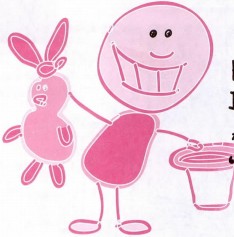发音:美式发音 语速:110词/分钟 使用方法:精听+听写
 从语言学的角度来看,kick是一个充满动感的词。因此,与它搭配而成的诸多习语,也带着强烈的动感之美。这其中,有一些习语,如“kick the bucket”、“kick somebody upstairs”,都历经了几百年文化的考炼,在今天使用起来,仍带有浓浓的历史厚重感。
从语言学的角度来看,kick是一个充满动感的词。因此,与它搭配而成的诸多习语,也带着强烈的动感之美。这其中,有一些习语,如“kick the bucket”、“kick somebody upstairs”,都历经了几百年文化的考炼,在今天使用起来,仍带有浓浓的历史厚重感。
From birth to death, the word kick has been given an important part in expressing human experience. The proud and happy mother feels the first signs of life kicking inside her womb. And that same life—many years later—comes to its end in a widely-used expression, to kick the bucket, meaning to die.
The expression to kick the bucket is almost two hundred years old. One belief is that it started when an English stableman[马夫] committed suicide by hanging himself while standing on a pail[桶], or bucket. He put a rope around his neck and tied it to a beam[梁] in the ceiling, and then kicked the bucket away from under him. After a while, to die in any way was called kicking the bucket.
Another old expression that comes from England is to kick over the traces, meaning to resist the commands of one’s parents, or to oppose or reject authority. Traces were the chains that held a horse or mule[骡] to a wagon[四轮马车] or plow[犁]. Sometimes, an animal rebelled and kicked over the traces.
The word kick sometimes is used to describe a complaint or some kind of dissatisfaction. Workers, for example, kick about long hours and low pay. There are times when workers are forced to kick back some of their wages to their employers as part of their job. This kickback is illegal. So is another kind of kickback: a secret payment made by a supplier to an official who buys supplies for a government or a company.
Kick around is a phrase that is heard often in American-English. A person who is kicked around is someone who is treated badly. Usually, he is not really being kicked by somebody’s foot. He is just not being treated with the respect that all of us want.
A person who has kicked around for most of his life is someone who has spent his life moving from place to place. In this case, kicking around means moving often from one place to another.
Kick around has a third meaning when you use it with the word “idea”. When you kick around an idea, you are giving that idea some thought.
There is no physical action when you kick a person upstairs, although the pain can be as strong. You kick a person upstairs by removing him from an important job and giving him a job that sounds more important, but really, is not.
Still another meaning of the word kick is to free oneself of a bad habit, such as smoking cigarettes. Health campaigns urge smokers to kick the habit.
Stories Behind the Idioms
● “to kick the bucket”=“to die”。关于这个词组有个被普遍接受的说法。很久以前有个马夫,他脚下踩着一个倒翻过来的桶(bucket),把头伸进早已系在屋顶房梁上的绳子,然后把桶踢开(kick),上吊自尽。从那以后,“to kick the bucket”也就有了“to die”的意思。不过,这个词组带有戏谑成分,对死者不太尊重,因此在日常生活中要慎用。
● “to kick over the traces”本来是用来形容马或骡这样的动物。当它们脾气不好或者不耐烦的时候,就会猛踢系在它们身上的缰绳(trace),以求挣脱束缚。久而久之,这个短语也开始用在人的身上,形容那些叛逆、反抗权威束缚的人。
● “kick about”在不同场合使用有不同的意思,例如文中,工人们“kick about”(抱怨)工时过长而工资太低,这里“kick”有“complain”的意思;但在通常情况下,“kick about”=“to move from place to place”(到处游荡)。
● 在文中,动词形式的“kick back”和名词形式的“kickback”指的是同一个意思,(付)回扣。不过,作为动词的“kick back”还有享受休闲时光的意思,与“hang loose”、“chill out”等词同义。据说有些语言学家认为“kick back”这个习惯用语来自于游泳时向后踢腿的动作,游泳时踢腿得法便能如鱼得水、进退自如。因此才衍生出“休闲放松”的意思。
● “kick around”有三个基本的意思:一,粗暴而轻率地对待某人;二,到处游荡;三,当它与“想法”之类的名词连用时,表示再三思考,从各个角度考虑。下面三个句子,大家判断一下它的意思,然后把它填在后面的横线上:
-Give me a few hours to kick it around, and I’ll let you know, OK?
-I’ve been kicking around Europe since I saw you last.
-He used to kick his sons around, now they’ve left home for good.
● “kick somebody upstairs”解释过来是“明升暗降”的意思。这个短语也有一段故事。旧时的英国议会,当一个内阁成员或议员使他所属政党处于尴尬境地,他往往被授予贵族爵位并从下议院议员晋升为上议院议员。但几个世纪以来,下议院一直掌握英国议会的权力,所以这看起来像是晋升,实际上却是剥夺权力的意思。于此相关,“kick somebody downstairs”则是“降级”的意思。
● “kick the habit”不难理解,即“戒去某种嗜好,戒除某种恶习”的意思。通常,这个“habit”倾向于指不良的习惯,如毒瘾等。
